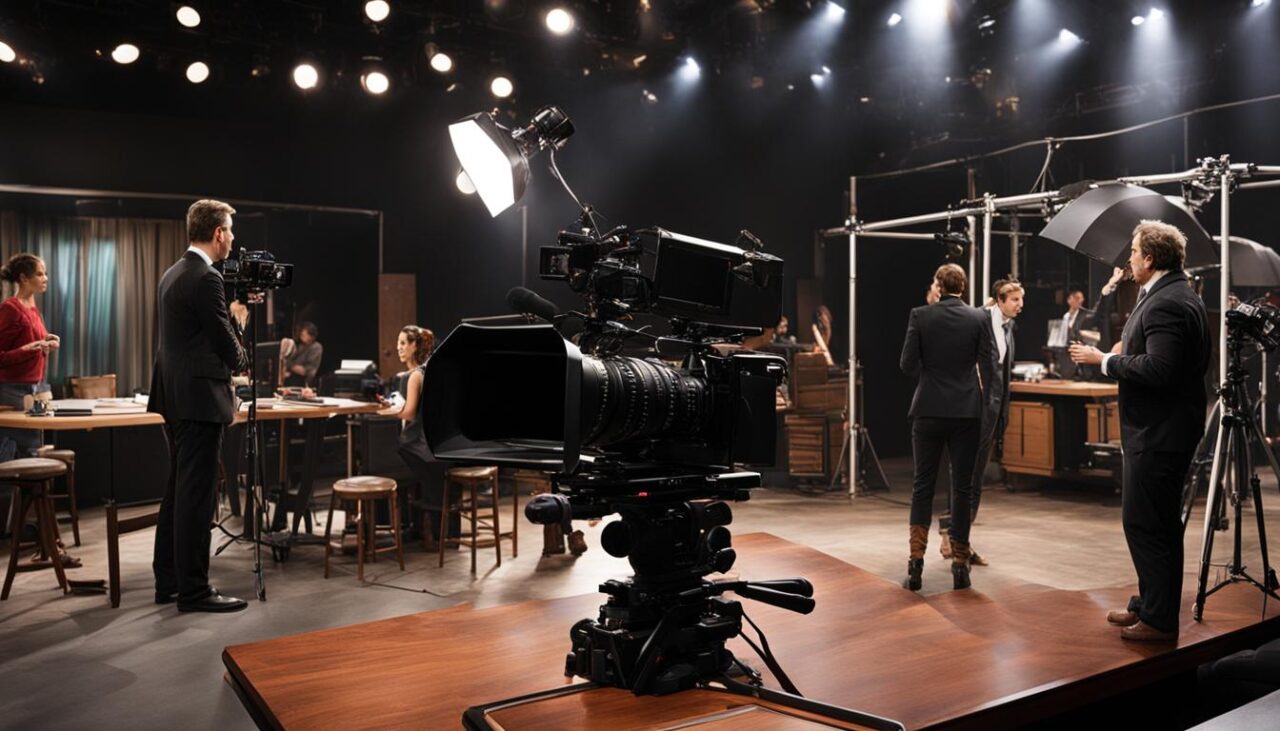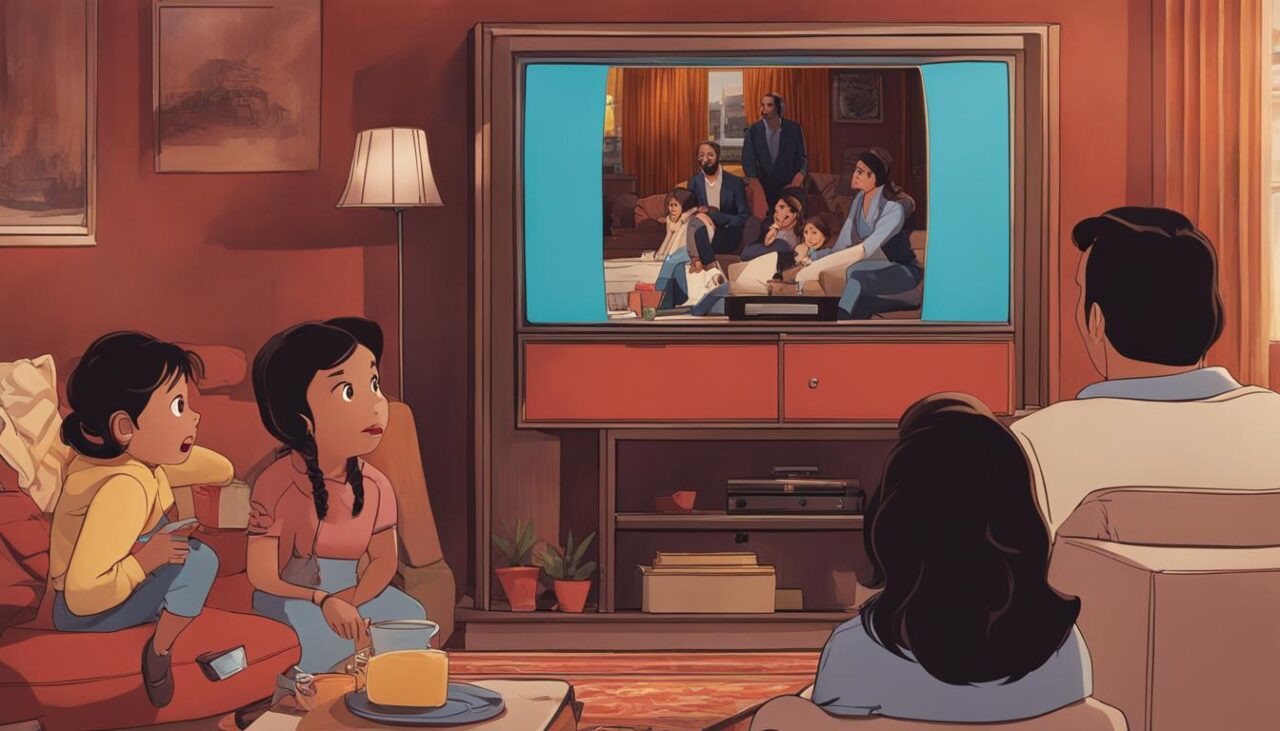The landscape of the entertainment industry has been significantly reshaped by the emergence of reality series, leading to a seismic shift in tv trends. As the line between fact and fiction continues to blur, the influence of reality television has sparked a critical examination of its role within our culture. This in-depth exploration will lay the groundwork to understand and analyze the various dimensions that reality entertainment encompasses, from its production mechanics to its societal implications.
Delineating the allure that ties audiences to the raw, unedited semblances of life presented in these shows, we shall venture into a realm where every expression, conflict, and triumph is subject to the viewers' scrutiny. Does this mean that reality television truly offers a mirror to our own existence, or is it a carefully constructed illusion designed for mass consumption? The following sections aim to dissect the benefits and detriments of this phenomenon, offering insights into its pervasive presence in the fabric of the entertainment world.
The Rise of Reality TV in Modern Entertainment
Reality TV's entrenchment in modern entertainment represents a seismic shift within television culture. As viewers yearn for authenticity and connection, reality tv has ascended to meet this demand, providing a portal into the unscripted lives that resonate with everyday experiences. This genre, known for its raw and often unfiltered approach to storytelling, has progressively carved out a substantial niche within the media spectrum.
From the domestic inception of game shows to the revolutionary launch of Survivor—often regarded as the catalyst of contemporary reality TV—this medium has undergone dramatic evolution. The path of reality television is punctured with milestone programs like Big Brother and The Real World, which broke new ground by offering viewers a voyeuristic lens into human interaction and competition.
Understanding why reality tv has captivated global audiences requires an examination of its key characteristics:
- Relatability: Audiences see themselves in the cast members, their triumphs, and their tribulations.
- Spontaneity: The unpredictable nature of unscripted content keeps audiences engaged, never quite knowing what will happen next.
- Participation: Interactive formats like public voting have created a participatory experience for viewers.
- Diversity: Reality TV embraces a wide range of themes, from culinary battles to romance quests, ensuring there is something for everyone.
This narrative form stands in stark contrast to traditional scripted television, where outcomes are predetermined and performances rehearsed. The unpredictable spontaneity of reality tv has established it as a formidable force in entertainment, connecting with viewers on a seemingly personal level.
Thus, reality tv continues to thrive, as it adapts with societal trends and technologies, cementing its role in the fabric of modern entertainment and altering the terrain of traditional television culture.
Behind the Scenes: How Reality Shows Are Produced
Gaining insight into the production of reality shows offers a fascinating glimpse into the genre that has redefined modern television culture. These shows often boast their ‘real' nature, but understanding the mechanisms of how they are crafted, from unscripted moments to meticulous cast selection, is essential in appreciating their impact and the reality television production process.
Unscripted vs. Scripted Reality
In the world of reality TV, the line between what is real and what is constructed can be surprisingly thin. Unscripted reality shows promise genuine reactions and spontaneous events, capturing life as it happens. In contrast, scripted reality includes scenarios that are planned in advance, shaping the narrative in a way that enhances drama and engagement. Understanding this distinction is key in evaluating the authenticity and ultimate value of these productions.
The Casting Process for Reality Series
Casting is a pivotal component of reality television production, influencing the dynamism and appeal of a show. Reality series casting calls attract a vast array of personalities, each bringing their unique stories and characteristics to the screen. The selection process is strategically designed to curate a cast that will not only entertain but also resonate with audiences, magnifying the reality tv impact on society's array of beliefs and attitudes. The diverse assembly of participants aims to mirror a slice of society, encouraging viewer connectivity and investment.
Editing Techniques: Crafting a Narrative
Post-production is where raw footage transforms into engrossing storytelling. Editing techniques in reality shows wield the power to craft compelling narratives that keep viewers hooked episode after episode. Editors weave together scenes to create tension, humor, romance, or rivalry, aggrandizing certain personalities and moments for dramatic effect. This creative manipulation often prompts a discussion concerning the reality tv impact and its portrayal of truth versus entertainment.

Cultural Impact: Reality TV's Influence on Television Culture
As a cultural phenomenon, reality television has reshaped the norms and landscapes of the entertainment industry with a profound cultural impact. This section delves deep into the sphere of influence exerted by reality TV over a wide expanse of our cultural milieu. Ranging from the way we speak to the aspirations it engenders, reality shows have carved out a substantial niche in television culture.
The lexicon we use today brims with phrases coined or popularized by reality shows, demonstrating a direct reality tv influence on our daily vernacular. Terms like ‘tribal council' and ‘not here to make friends' have transcended their on-screen origins, reflecting the genre's reach beyond mere entertainment.
- Emulation of Reality TV Personas: A testament to the genre's grip is the widespread mimicry of characters and lifestyles from reality TV. Audiences often idolize these personalities, copying their fashion, mannerisms, or even life choices.
- Reality Shows Shaping Social Norms: Reality television has not only set trends but has been pivotal in challenging and reshaping societal norms, driving conversations around important themes such as identity, politics, love, and social stratification.
- Altering Entertainment Standards: With its raw and often unvarnished portrayal of life's dynamics, reality TV has redefined audience expectations for entertainment, blurring the lines between the performative and the genuine.
The ubiquity of reality TV points to a larger shift in the collective psyche—an appetite for authenticity, however stylized it may be, reflecting an era where the boundary between fame and the everyday grows increasingly thin.
Ultimately, the cultural impact of reality television provokes a reflection on the evolution of storytelling and representation within the broader context of contemporary media. It signals a transformative era where the erstwhile passive audience now seeks a mirror in its entertainment—one that reflects a version of their reality, or perhaps, a reality they aspire to. As reality TV continues to branch out into diverse formats, its legacy and influence remain powerhouse factors in the landscape of television culture.
The Psychology of Reality: Viewer Engagement and Reality Television
Understanding the connection between audiences and reality TV requires an exploration into the cognitive processes that underpin viewer engagement and emotional investment. As viewers tune into reality programmes, they embark on a psychological journey, feeding their innate curiosity and desire for social comparison. The allure of reality TV lies not only in its entertainment value but also in its ability to resonate on a personal and sometimes visceral level with its viewers.

Why Audiences Connect with Reality Programmes
Why are viewers drawn to reality TV with such fervor? The answer taps into the very foundations of reality tv psychology. These shows frequently present individuals and situations that viewers can relate to, echoing their own experiences or aspirations. This relatability establishes a potent connection, forging a sense of familiarity and personal relevance that scripted shows are hard-pressed to match.
Reality TV and Emotional Investment
The emotional investment that reality TV elicits is profound. Audiences become vested in the triumphs and tribulations of participants, often experiencing a rollercoaster of emotions from the comfort of their living rooms. This investment is a psychological hook—once viewers care about the outcomes, they are significantly more likely to continue watching, rooting for their favorite characters, and becoming partly emotionally dependent on their weekly fix of reality.
Identification with Participants
Perhaps one of the most profound elements contributing to the viewer engagement in reality programmes is the identification with participants. Reality TV blurs the lines between spectator and star, allowing viewers to imaginatively project themselves into the situations unfolding on screen. This vicarious experience serves as an escape, a source of inspiration, or a comparative backdrop for one's own life. It's this unique blend of empathy, envy, emulation, and attachment that fuels the continuing success and relevance of reality TV.
- Relatable content fosters attachment
- Emotional narratives maintain viewer interest
- Identification with participants deepens engagement
In sum, the psychological appeal of reality television is multifaceted, leveraging the power of emotional investment, identification, and relatability to maintain a steadfast viewer base. As reality programmes evolve, they continue to tap into the intrinsic psychological needs and desires of their audience, guaranteeing their position within the pantheon of modern entertainment.
The Reality of Reality: Criticisms and Controversies
Reality TV, often praised for its raw depiction of human dynamics, has also faced its fair share of criticism and controversy. Within television culture, these programs have sparked extensive debate over their presentation and impact. Critics have pointed out a range of concerns, directly challenging the integrity of this pervasive genre.
Criticisms of reality shows have not only highlighted the ethical conundrums involved in their production but have also raised questions about their influence on societal values. A recurring point of contention is the authenticity of what is presented to viewers. Despite being labeled as ‘unscripted,' many argue that these shows are anything but, with reality bending under the pressure of dramatic editing and producer-driven narratives.
The discussion on reality tv often pivots to the portrayal of stereotypes. These programs, in order to captivate audiences, can sometimes reduce complex individuals to caricatured versions of themselves, reinforcing harmful clichés and prejudices.
The portrayal of stereotypes in reality television can be dangerously limiting and contribute to warped perceptions among viewers, leading to a misrepresented and shallow understanding of diverse communities and personalities.
Moreover, contentious practices such as the exploitation of participants for ratings tap into the heart of the controversy. Reality TV sometimes teeters on the precarious edge of ethical production, prioritizing spectacle over the wellbeing of its stars.
- Questions about the reality portrayed versus the reality experienced by participants.
- The potential for perpetuating misinformation and manufacturing drama.
- The psychological effects on participants and viewers alike.
Such issues are pervasive within the television culture and ripple out to affect societal norms and expectations. The criticisms and controversies surrounding reality TV are not just industry chatter; they reflect larger concerns about the media's role in shaping public consciousness.
Reality Television's Impact on Society
The influence of reality TV on modern culture cannot be overstated; it reaches into various segments of daily life, wielding the power to alter perceptions and norms. This dualistic impact of reality television provokes both admiration and critique due to its significant role in molding social behavior and broadcasting tangible reality television outcomes.
The Positive Outcomes of Reality Shows
Amidst the plethora of reality TV content, certain programs stand out for their constructive contributions to society. They entertain while delivering profound messages, fostering awareness on critical issues ranging from the importance of empathy to environmental concerns. Oftentimes, reality shows become platforms for advocacy and charity, inspiring positive change and mobilizing viewers towards community engagement and acts of kindness.
Reality TV can function as a catalyst for personal growth and social change, sparking conversations that resonate beyond the screen and into the heart of societal discourse.
Negative Repercussions on Social Behaviour
While the genre can inspire, it is also responsible for unfavorable shifts in social behavior. The reality tv impact may extend to magnifying aggressive conduct, glamorizing unhealthy competition, and highlighting sensationalized personal drama. This exposure sometimes results in skewed perceptions of reality, fostering an appetite for voyeurism and inadvertently normalizing intrusive curiosity into others' lives.
- Celebration of confrontational dialogue as ‘entertainment'
- Proliferation of stereotypes through typecast participants
- Risk of audience desensitization to scripted ‘reality'
Reality TV's Role in Shaping Values and Norms
Reality television serves as a reflection of society's evolving standards. It can reinforce existing values or challenge them, depending on its thematic content and the behavior it rewards. In its most effective form, reality TV fosters diversity, inclusiveness, and understanding by showcasing a variety of lifestyles and perspectives. Conversely, reality shows can also perpetuate traditional norms, restraining progressive thought and setting the standard for what is deemed socially acceptable or desirable.
Its influence is palpable, seeping into the viewer's consciousness, and shaping public opinion on issues both trivial and profound.
Evaluating the Pros and Cons of Reality Shows in Entertainment
The landscape of television is frequently shaped by the presence of reality shows, delivering a blend of spontaneous entertainment and orchestrated drama. As viewers tune in to their favorite reality series, they grapple with the dichotomy between reality shows' entertainment value and the genuine quality of the content provided.
Entertainment Value vs. Quality Content
Reality television has long been debated for its ability to engage audiences with content that ranges from authentic, unfiltered experiences to highly produced spectacles. The reality shows pros and cons are most evident when comparing their entertainment value—often high due to their addictive format and relatable scenarios—with the perceived lack of quality content that stems from concerns about scripted elements and a focus on sensationalism over substance.
Reality TV's Contribution to the Entertainment Industry
Despite the critiques, the contribution of reality TV to the entertainment industry cannot be overlooked. By pioneering varied genres and groundbreaking concepts, reality programming has been instrumental in revolutionizing television, driving innovation, and providing employment. A testament to its influence is the myriad of reality shows that span across networks, each offering unique perspectives and storytelling methods.
Analyzing the Critiques of Reality Programming
The reality programming critiques center primarily on the ethical dimensions of production, including the treatment of participants and the reality of what is being portrayed. Calls for transparency and ethical reform suggest that while reality television continues to be a staple of modern entertainment, there is room for improvement to better align practices with the expectations of both participants and viewers.
“While reality TV can sometimes offer a distorted lens on life, its success hinges on the viewers' desire for both connection and escapism.”
- Pros: High viewer engagement, innovation in television, wide range of content.
- Cons: Questionable content quality, potential ethical concerns, impact on societal values.
In summary, the place of reality shows in entertainment is multifaceted, with a balance of both positive contributions and areas for critique. The ongoing conversation around these programs underlines their significance to both viewers and the industry, promising a reflective evolution of reality television in the years to come.
Conclusion
The vast expanse of the reality TV landscape has been meticulously navigated throughout this examination, providing insights into its intricacies and its ubiquity in modern culture. Now, as we stand on the precipice of a dynamic future for the entertainment industry, we look forward toward the advancing horizons of televised realism. Reflecting on entertainment trends, we prognosticate on the ramifications reality TV may continue to have on viewership, culture, and the shifting sands of production ethics.
Reflecting on the Future of Reality in Entertainment
The forecast for reality tv future remains robust as producers and networks constantly innovate to satiate the insatiable tastes of a diverse audience. With virtual and augmented reality technologies knocking at the door, the potential for hyper-immersive experiences could redefine the essence of ‘reality' in reality TV. Whether these advancements will further blur the lines between the genuine and the staged, or perhaps create an entirely new genre, remains an intriguing enigma. The challenge for creators will be to navigate these uncharted waters while continuously engaging an audience that craves both novelty and relatability.
The Balance Sheet: Weighing the Good and Bad of Reality TV
When tallying the reality tv pros and cons, it becomes evident that the genre possesses both a remarkable capacity to captivate and to contribute to discourses on societal issues. It is a unique social mirror reflecting the multifaceted nature of human existence, yet, at times, it casts a shadow by perpetuating stereotypes and prioritizing sensationalism over substance. In order to maintain relevance and respect in the face of ever-evolving viewer sophistication, the stewards of reality television must maintain a vigilant self-awareness and foster content that balances entertainment with ethical storytelling. As we continue to witness the growth and metamorphosis of this genre, it will undoubtedly remain a formidable force within the tapestry of global entertainment.







